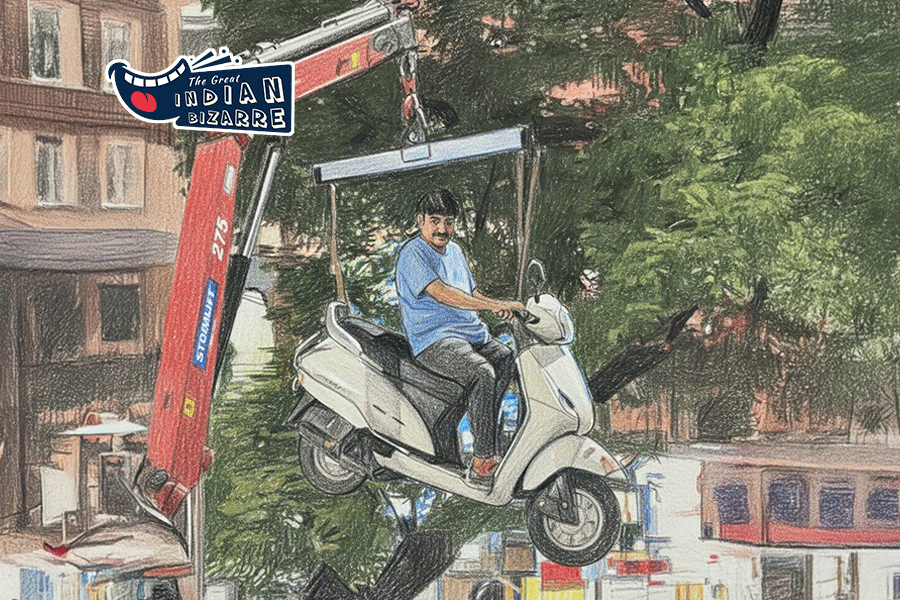 |
As you watch a Rituparno film, you start asking a germane question. What exactly is the role of a reviewer? Is it simply to review a film? Or, is it to go beyond that and interpret the film to the audience for his better understanding and appreciation. Or, is it to carry on an imaginary dialogue with the director?
Frankly, I don’t know the answer. But this is not to say that Abohomaan is abstruse, vague or full of impenetrable allusions. The problem is with Ritu’s dispensing with the narrative style altogether.
In The Last Lear, there was a clear-cut story. What he had done there was break up the linear style of narrative, so the story moved back and forth in time. That’s okay. In Shob Charitra Kalponik, too, he did the same, but with a difference. Here, he slipped in Bergmanesque elements of dream and mixed them up with reality. Which was lovely. Though the general film-going public couldn’t make that out. And now, in Abohomaan, there’s a further departure. No more dream or seance-like sequences here. But parallel storylines being layered into one another.
I better explain. There is a main storyline which deals with the life of a well-known film director Aniket (Dipankar), his wife Dipti (Mamata), and their son Apratim (Jisshu). The director makes a film on Nati Binodini, falls in love with the main actress, Shikha (Ananya), and brings his personal life into serious jeopardy. So far so good.
But, then, there is another parallel story, which is the real life of Nati Binodini with the great thespian Girish Ghosh (Sumanta). To heighten the eeriness of this juxtaposition, he even makes Ananya do both roles.
Which is fine. But now complications follow. You have a sequence of this director in the process of making this film as well. But there’s nothing to suggest that the Girish Ghosh-Binodini sequence is part of the director’s film. Then, there are other elements, episodes in the film. The director and his son at a hill station exploring the meaning of cinema. Or, is it life itself? Aniket says he prefers the video medium because it enables you to create, erase and create again. Isn’t that what life is all about?
Then, there’s Apratim’s personal life, rather sketchily drawn, in the form of his pregnant wife (Riya) and mother-in-law (Saswati) in tow. And, then, there’s the director’s mother (Sova) and her rather tetchy relationship with her daughter-in-law. Also, brooding scenes between Dipti and Apratim as the latter watches with horrid fascination his mother suffering silently from the director’s ‘misplaced’ affections.
Ideally speaking, all these parts should have added up to something more than the whole. Alas, they don’t. A series of beautiful, evocative scenes, arbitrarily pieced together does not necessarily a great movie make. You need a fabric of meaning to run through the film, from beginning to end, for the audience to take back with them.
 |
That doesn’t happen in Abohomaan. Which is sad. Abohomaan is also replete with Ritu’s pet preoccupation with death. Last Lear, Shob Charitra, Abohomaan... all veer around the death of the central character.
And then, there are elements drawn from movies of other filmmakers. Shikha’s sister, Lekha, is drawn from Paromitar Ekdin, a corridor sequence reminds you of the Bimala slo-mo sequence in Ghare Baire. And, the similarities between Aniket’s life and that of a famous director from the past. And then, Ritu’s efforts to obfuscate them by erecting a fledgling relationship between the actress and the director’s son Apratim.
The question is, why? To what end?
I have a suggestion for Ritu. Which brings me back to the original question of the role of the reviewer. This is not sermonising. Rather, a passionate plea, a request from the heart. Before Ritu makes his next film he should ask himself just one simple question. What’s the film about? The rest would take care of itself. More than many of the current crop, Ritu has the gift of creating cinematic magic. Let it not be restricted to individual scenes.
Another small point. Beautiful scenes, if carried too long, start to drag. Satyajit Ray, whom Ritu so obviously adores, believed in keeping his beautiful scenes brief. He said that way people would want to see them over and over again.
P.S. Acting in Abohomaan is top-draw. Ananya (so beautiful and sensuous), Dipankar, Sovadi (what a pleasant surprise), Mamata Shankar (though at times her delivery is too studied), Jisshu, Sumanta, Riya... all of them are unbelievably good. Avik’s (Mukhopadhyay) cinematography needs no reiteration. He’s virtually in a class of his own. Indranil’s (Ghosh) art direction is professional, yet unobtrusive. Technically, you can’t touch Abohomaan. Even the direction is first class. If only the dazzling fragments could make a necklace.
Did you like/dislike Abohomaan? Tell t2@abpmail.com











